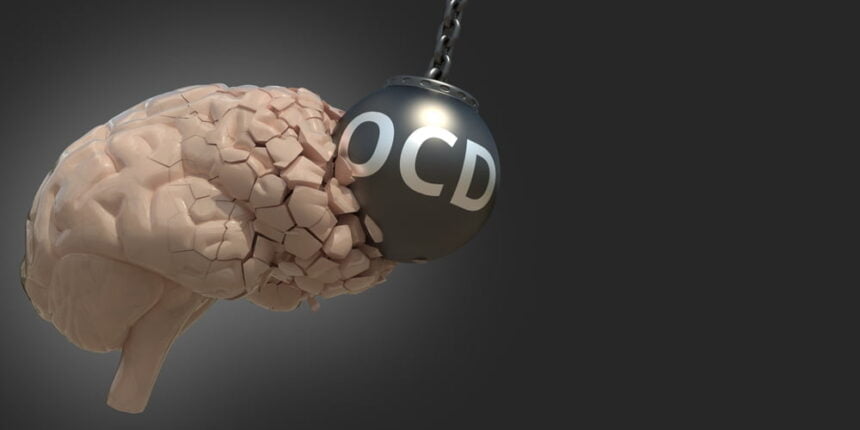Many people with a substance use disorder also suffer from a co-occurring disorder. Individuals living with mental health conditions like anxiety and depression may turn to substance abuse as a coping mechanism, seeking short-term relief from emotional distress. Over time, this can develop into an addiction, which only serves to worsen, rather than improve, their mental health.
Obsessive-compulsive disorder (OCD) is one of the most common co-occurring disorders. OCD is usually classified as a type of anxiety disorder, characterised by the frequent experience of obsessive thoughts and compulsive behaviours.
Obsessions are unwanted and intrusive thoughts, urges, or images that persistently enter someone’s mind, causing emotional distress. Compulsions are repetitive physical or mental behaviours that they engage in to temporarily relieve the emotional distress caused by the obsession. However, this relief is only temporary, and the obsession returns soon afterwards.
Research suggests that the risk of developing substance dependence in people with OCD is significantly higher than amongst people with a psychiatric disorder. Moreover, the co-occurrence of substance dependence in men with OCD is higher than amongst people with psychiatric disorders other than OCD.
Scientists suggest a range of reasons that may explain the link between OCD and substance abuse. These include:
- Self-Medication – Some people may use alcohol and drugs as a temporary relief from symptoms of OCD. OCD is often kept secret, undiagnosed, or misdiagnosed, with over 50% of people receiving an incorrect diagnosis. The lack of access to effective diagnosis and support may increase the likelihood of people turning to substances as a coping mechanism.
- Common Risk Factors – Many of the risk factors for developing substance use disorders are also risk factors for OCD. These include genetic factors and environmental stresses such as childhood trauma which may make an individual vulnerable to both.
- Mental Effects of Substances – Some substances can have short-term and long-term side effects that exacerbate mental health conditions like OCD. They may alter the balance of brain chemicals, disrupt sleeping habits, and harm someone’s physical health.
The co-occurrence of OCD and substance abuse, however, may not be linear. A 2021 paper published in the Journal of Neuronal Behavioural Sciences found that while mild OCD was characterised by a high co-occurrence of substance use disorders, this decreased as the severity of OCD increased until a certain threshold, before rising again amongst people with severe OCD. They also note that the co-occurrence of OCD and substance use disorders is less amongst people seeking treatment than it is in the wider community.
The authors suggest that the use of substances as self-medication may explain why substance abuse is higher amongst those in the community (who may not be receiving any other support) than those in clinical settings. They propose that the decreased prevalence of substance use disorders amongst those with moderate OCD symptoms may reflect certain personality traits associated with OCD, such as risk avoidance and fear of harm.
While the co-occurrence of OCD and substance abuse is well established in scientific literature, recent research has argued that OCD and addiction may be linked on a conceptual level. According to a 2016 paper, the compulsive behaviours that characterise OCD may be conceptualised as a type of behavioural addiction, similar to problem gambling.
Their theory is built upon the element of compulsivity present in both OCD and addictive behaviours. Addiction, specifically behavioural addiction, is when a person compulsively engages in a certain behaviour, despite any negative consequences. Someone with a gambling addiction, for example, may compulsively gamble even in the face of financial ruin or the breakup of their relationships. Likewise, someone with OCD may compulsively count or wash their hands, despite knowing that it will not resolve their obsessions in the long run.
To explore the link further, scientists looked at the shared brain chemistry of OCD and addictions. Substance and behavioural addictions are characterised by physical changes to the reward system of the brain.
The reward system is a normal part of how the brain works, encouraging us to repeat life-preserving behaviours. When we engage in an activity like eating or having sex, our brain releases small amounts of chemical messengers (neurotransmitters) such as dopamine and endorphins. These chemicals signal to the brain that something important has happened and alter neuronal connectivity in the brain, making it more likely that we will repeat the activity.
With behavioural addictions, repeated engagement in certain ‘rewarding’ activities causes our brains to form connections that are much stronger than usual, sometimes with activities that in the long-term are detrimental, rather than beneficial, to our survival. These physical changes in our reward systems cause compulsions to engage in behaviours that are very strong and difficult to resist, despite any negative consequences.
The reviewed data suggest that compulsivity in OCD is likewise related to impaired reward and punishment processing associated with dopamine release in the ventral striatum of the brain. There were also common features related to negative reinforcement in limbic systems, diminished serotonergic prefrontal control, and habitual responding with imbalances between ventral and dorsal frontostriatal recruitment. The authors suggest that these similarities may help researchers to identify preventions and treatments for people living with OCD, addiction, or both.
While both OCD and addiction can be serious conditions, there is effective support available for both. Mental health treatment approaches such as behavioural therapies and medication can help individuals to manage symptoms, overcome addiction, and lead productive and fulfilling lives. As advances in scientific research and exploration of the mechanisms behind addictions and compulsions continue to develop our understanding of both, experts hope that these treatments and prevention strategies will continue to strengthen and expand.










